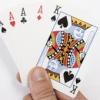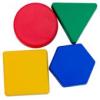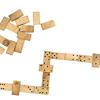Search Results
Showing results 1 to 20 of 26
Stacking Dice
Source Institutions
In this math game, learners try to earn the most points by winning stacks of four dice. Learners practice number recognition and addition skills.
What's the Difference?
Source Institutions
In this sorting activity, learners play a game in which they try to identify the largest number of differences between two objects.
Pass or Roll!
Source Institutions
In this math activity, learners play a game in which every roll can earn you counters, but if you roll the wrong number (6), you have to put everything back.

Treasure Hunters
Source Institutions
Learners use their opponent's clues and a compass rose to find the hidden treasure on a map. Learners use problem solving and coordinate grid skills as they hunt for treasure.
Number Flips
Source Institutions
In this math activity, learners play a number game to explore the relationships between numbers, combinations, and the concept of equivalency.
Frustrations with Fractions
Source Institutions
In this math activity, learners make a set of fraction cards to play a game that will help relieve their fraction frustrations.
Pattern Sticks
Source Institutions
In this activity, learners compete to be the first to win twenty counting pieces. First, learners draw patterns on only one side of four craft sticks.

Is it a Fair Game?
Source Institutions
In this math activity, learners play two versions of a card game and decide what makes a game fair. Learners also practice addition and subtraction skills.
Race to the Dollar
Source Institutions
In this math activity, learners play a card game to practice adding coins quickly, just like a banker. First, learners create coin cards. Next, the cards are dealt to each player.

Circle Logic
Source Institutions
This is a deceptively simple game to teach strategy, planning, and pattern analysis. In this game, learners take turns removing tokens from a board, and develop a plan to take the last piece.
Take a Guess
Source Institutions
In this activity, learners use what they know about probability to figure out what is in a mystery bag. Learners analyze data to guess how many of each color crayons are in the bag.

Dicey Directions
Source Institutions
In this game, learners are stuck in a right turn only world! Learners take turns rolling a die and moving their game pieces along the lines of a grid to get "home," by only making right turns.

The Great Toss Off!
Source Institutions
In this math game, learners toss plastic cups to land just right and collect points to win.
Pom-Pom Probability
Source Institutions
In this math activity, learners predict how many pom-poms they can toss inside a circle from three feet away. Use this activity to help learners explore probability.

Two Sets!
Source Institutions
In this card game, learners make two sets of three cards that are alike. Learners must justify to the rest of the players why the three cards belong in each set.

Copy Cats
Source Institutions
In this math activity, learners use what they know about shapes to copy a friend's hidden picture. Learners create a design out of pattern blocks and then hide their picture behind a screen.

Guess My Rule
Source Institutions
In this math activity, learners play a game and try to be the first player to identify their partner's rule. Learners identify the rule by finding commonalities between three familiar objects.

Bank It!
Source Institutions
This simple but open-ended math game introduces basic probability concepts using coins and dice. Players roll the dice and collect coins to match the number rolled.
Squeeze Me!
Source Institutions
In this math activity, learners guess a secret number between 1 and 100 in a three-player game.

Domino Trains
Source Institutions
In this activity, learners practice matching and subitizing as they create the longest domino train possible.
